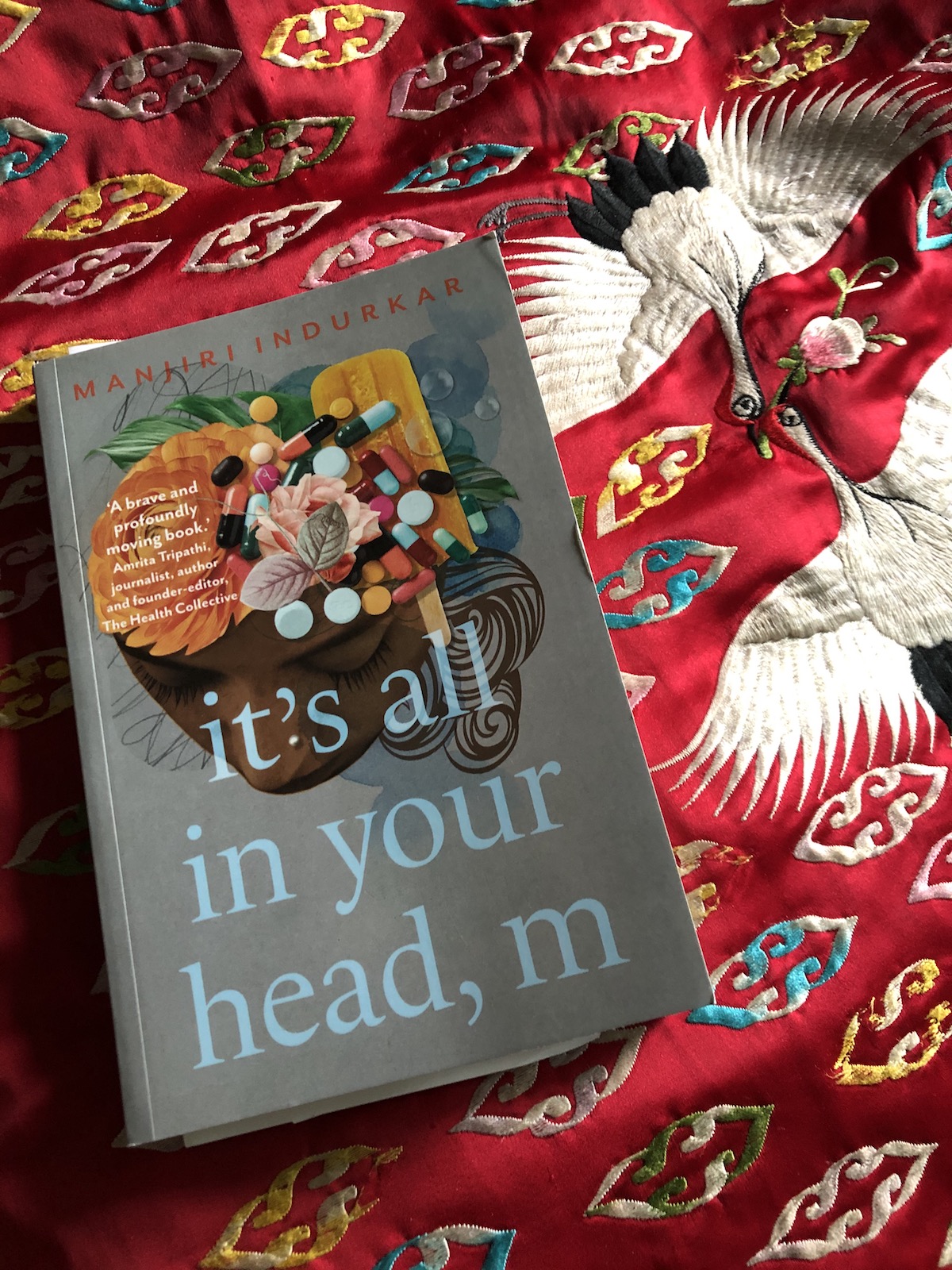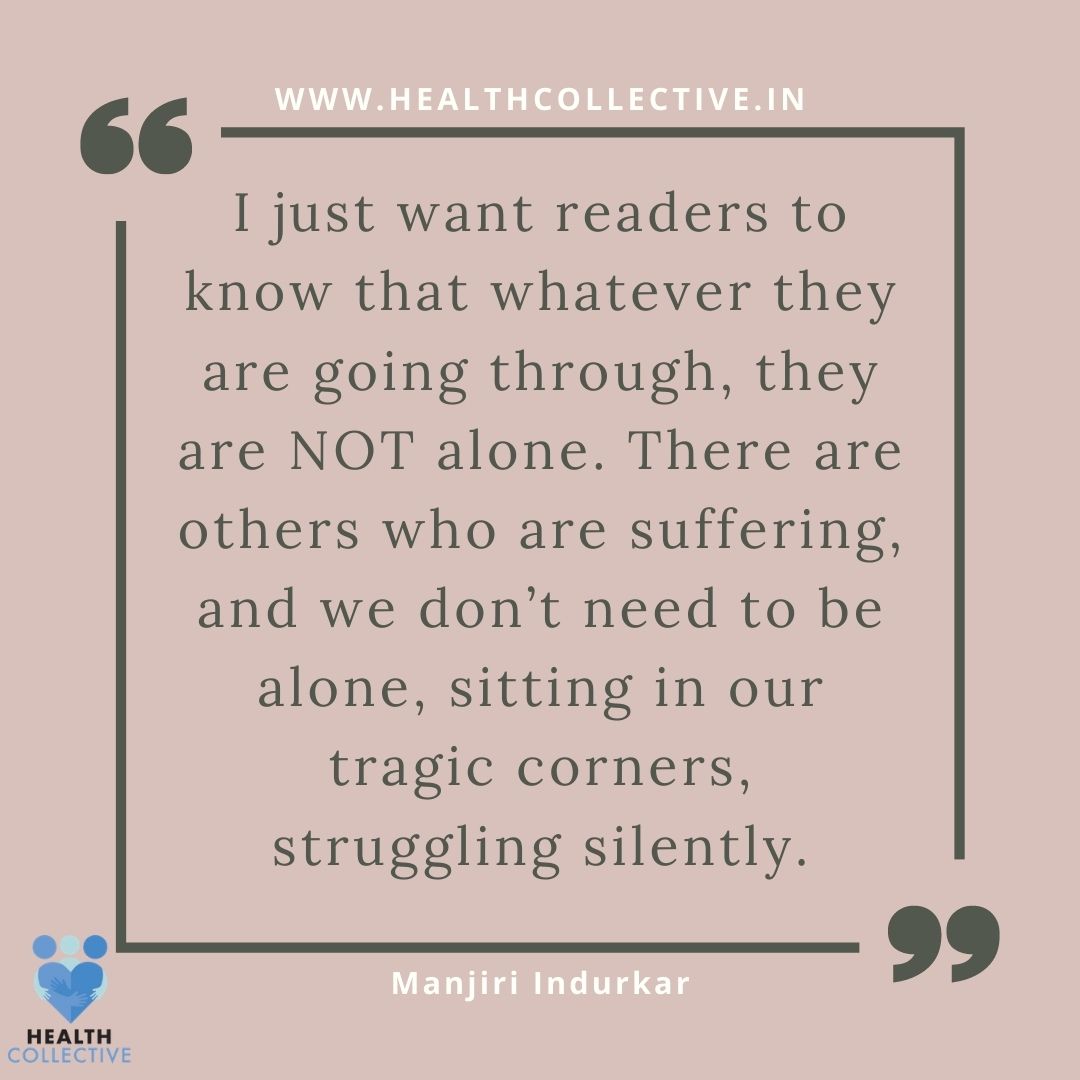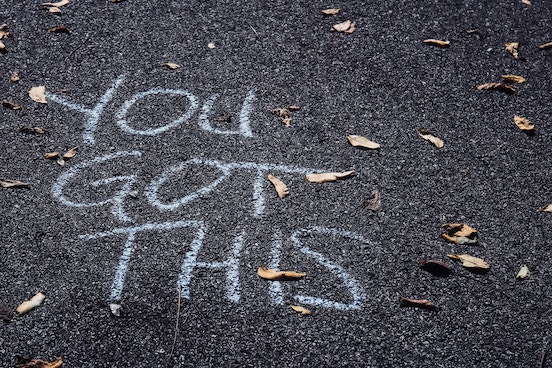Your Stories: From Jabalpur to Delhi, Physical to Mental Health and Back Again
By Amrita Tripathi
A couple of months ago, I had the good fortune of being sent an advance copy of a manuscript titled It’s All in Your Head, M by Manjiri Indurkar. I couldn’t put it down, once I started reading, and that’s as much to do with the moving story — a very personal one which the author has shared very bravely — as with the language and writing. I’m so delighted that the book finally releases this week and that we can share this e-interview with the author right here.
ALSO READ: It’s All in Your Head, M: An Excerpt
Trigger warning: Child Sexual Abuse, Trichotillomania
Watch the Digital Launch of It’s All in Your Head here
ALSO READ
- Can you share a little bit about the excerpt we are publishing?
Manjiri Indurkar: There are things — memories, images, knowledge — that you have lived with all your life. You know what is what, what had happened on such and such day, why it is important, but it doesn’t bother you till you let it bother you, even for a minute. And it’s all done. The thing I write about in this excerpt is about a bad stomach bug I had caught in 2014. The memory of it still gives me nightmares. But the anxiety of that period was different, intense, all consuming, and whatever exists beyond irrational. The stomach bug that gave me serious diarrhea landed me on a hospital bed where I stayed for a week. This incident triggered my serious engagement with mental illness. It started with health anxiety, which came in with various shades of depression, and then means of dealing with that in the form of trichotillomania.
What I hadn’t understood then and what took me a little over a year three therapists to understand was the function of that event in my life and how of course if you don’t want to see your illnesses as any form of metaphors, I don’t blame you, but this one I couldn’t help see it as one. It forged a strong and complicated relationship with my body, forced me to open doors to my past, and deal with things I really thought I was taking to my deathbed. What I am trying to say, in a very inarticulate manner perhaps, is that I don’t think I would have talked about my child sexual abuse experience, opted for therapy, written this book, told me parents, done all the good and weird things I have done had it not been for that one bad night of January 2014.
2. You end the preface to It’s All In Your Head, M by saying, “This book will be my awakening”. Take us through what it means for you to have completed this, shared so much of your own journey and whether it does feel like an awakening?
Manjiri Indurkar: I think it means that there are fewer corners available for me to hide. When I was writing this book I constantly had this feeling that my body is leaking from various places, places I didn’t even know existed. My body was emptying itself on the paper, sometimes spilling in indelicate ways. That is what this book is comprised of, many of my gory secrets. Now that I am done with it, I feel empty in many ways. I don’t have to dip into my misery anymore, my secret is out, and I was only reluctantly carrying that with me. I don’t have to anymore. It is freeing. But also scary, because now it’s out there, for people to read and judge. And to make good and bad comments, I have no control over that bit of my life, and there is some struggle in letting go of that.
But otherwise, yes, this book has brought me so many answers, has ‘awakened’ me to some ideas that I was afraid of, that I was making up in my head that felt like an angry resilient knot that just won’t unknot. When I started writing this book I didn’t know how much of the child sexual abuse detail I was going to give out. I didn’t give everything, but enough I think. I started out with What will so-and-so say or think? How will it impact them? And that still worries me, but it was while writing that I realised that my responsibility here is towards the child that M was, and it is her story to write, if she wants it, I have to write it, and I did. I think a lot of it got written because it just had to be, there was no way out of it. Therefore I think it is right to say that writing this book really brought me closer to myself, and in that sense, there was some awakening. And it helped the inner child find some peace.

3. You’ve shared a lot of your very personal journey with readers. What led you to want to share? And was there any voice at the back of your mind worrying about sharing so much?
ALL THE TIME. Voices in my head are very annoying, they are constantly telling me to not do things, I think I haven’t been able to follow my instincts mostly because of these voices, I am always cautious, too cautious. It is one of the things I have been working on with my therapist. The voices in my head had actually warned me against writing this book at all. When I was asked to write it by my agent Kanishka Gupta, I had a full blown panic attack even thinking about this book, what it would mean to me and my loved ones. I took a while to make up my mind. When I was drafting my chapter plans, the voices again were asking me to be conservative in my estimation of the ‘tragedies.’ Do you really want people to read this about you? Do you think this is a good thing to let the world to know? It was a constant fight, sometimes I won, sometimes they did.
The desire to share these stories from my life really began with the first essay I wrote and how it made me feel less lonely. People were reaching out, sharing their stories, and that gave me a lot of strength, and it also taught me that writing matters. I am obviously a nobody, and people in all probability are not going to be interested in this book which is fine so long as it makes even one person feel less lonely. It was this desire to find my place in this world, find a community that sort of started this process, and then it just was a question of taking it forward. There were always enough people reading, sharing their stories, telling me that they want to hear me and want me to hear them. In a way this book is for each one of those people who are fighting their solitude and looking for a friendly companion.
ALSO READ: YOUR STORIES: HOW TO TRAVEL LIGHT
4. When it comes to most forms of mental illnesses or disorders, do you find that it’s still quite difficult to have these open conversations? Whether in Jabalpur or Delhi? Or do you find there’s been a gradual change?
Manjiri Indurkar: Yes there has been change. It may not be a big change but it is a significant one. From my friend circle opening up about their struggles, recognising that it is a struggle and not just general sadness, to people found on dating apps mentioning about their mental illness in their bios some of us are trying to own our struggles and demanding space. Which indicates the distances we have covered in the last decade.
But of course these are unfortunately also related to our privileges. Access to therapy is a privilege. To even be able to have these conversations is a matter of class and cultural privilege. And that is a giant bridge we haven’t crossed. But I not going to rubbish all the steps we have taken forwards in the right direction. I don’t think I would have written this book ten years back, mostly because I was too young and stupid but also because I may not have found a publisher interested in these stories and now they are doing that. My book aside, I have a friend whose book is coming out next year where she deals with her mental health woes.
There are writers like Jerry Pinto, and Amandeep Sandhu who have constantly pushed the narrative forward. Shreya Ila Anusuya who edits Skin Stories, a journal dedicated to talking about disabilities. Then there are you, Ratnaboli Ray, and Jhilmil Breckenridge, the work you are doing. Maybe we can call it my ignorance, but I could not name as many people in the last decade. That itself is a big thing. We just have to keep moving forward. I am an optimist in some sense because the alternative feels like submitting to the status quo. And I am not writing off this progress which is small in the larger scheme of things, but still quite something.
5. You share very evocatively about how trauma and abuse and repressed memories impact your physical health — It’s not a self-evident truth. Can you tell us a bit more about this for this interview, perhaps including some of your journey to healing, about whether therapy helped and how you are now? Was it helpful to get a diagnosis?
Manjiri Indurkar: It was Bessel A. van der Kolk’s book ‘The Body Keeps the Score’ that taught me to approach my body with curiosity rather than fear. Understanding my quickly failing physical health, how my body was keeping a score of all my traumas and its after effects — I would not take the train or go for walks because I was scared my stomach is going to give up on me, I was not losing weight, and feeling ugly (I have thought of the word fat as a bad word, I don’t anymore, most days at least) but carrying on because of this idea that ugly people don’t get raped — there were just too many things overlapping, merging with each other, and adding to my body’s overall ill-health. When I started communicating, I didn’t change radically, because it never has worked that way, but I realised that fear cannot be the driving factor in my life. Despite my fears, I had to do things, I had to live my life and living in pain all the time might not be such a good idea then. All these worries and fears stacking up and making my body crumble under its own pressure was really a terrible way of living.
Therapy really helped in a way that it didn’t overwhelm me.
I was told that I am clinically depressed and I have anxiety disorder. So, I am not lazy, it is just harder for me to move than others. I have to try harder, but I don’t have to keep blaming myself. Diagnosis took away the guilt to some extent, it gave me a slightly positive outlook towards life that I didn’t do this to myself, things were done to me, and it is unfair that I have to deal with the repercussions of that but at least I know I am a victim and not the culprit. I am doing better because of that knowledge. Though this lockdown has come as a setback, I am more anxious and depressed because of the general environment in country and the world and this feeling of being cooped up that I am too well acquainted with is scary, but I also know I can change things, and take my time with that. I am more open to pushing my body, and I am still in therapy which really is something that keeps me going.

6. What would you want readers to take away from this book?
Manjiri Indurkar: I just want readers to know that whatever they are going through, they are NOT alone. There are others who are suffering, and we don’t need to be alone, sitting in our tragic corners, struggling silently. We can and should be loud, talk and listening. Most mental health disorders are along with the medical component, are a response to our environment. If a community did this to us, another community can help us heal. We need that. At the heart of healing is a strong supportive community and I hope my book is seen a small part of that support system.
7. Do you have a message you might want to tell a younger Manjiri?
Manjiri Indurkar: Just that things are about to get so much worse, and then they are going to get so much better, just hold on, keep doing your thing. Maybe start talking about the things that matter to you more, and talk less otherwise in general. Your mother does not need to know what some kid in the next section did to her hair, but she does need to know what is happening to you, it would be nice if you talk about that along with that bad hair story. But if you don’t, that’s fine too. It’s not a secret you are taking to your grave, even if you think you are. And that it will be okay. You are loved and you will continue to receive that love. You were born lucky that way.
8. How does it feel to see It’s All In Your Head, M out in print? Any reactions that have surprised or even delighted you?
Manjiri Indurkar: Surreal. I am still at that stage where I cannot really believe that I wrote a book and someone published it even. It is a good feeling. But I am also scared. People might end up hating the book and in extension hating me. This part of being vulnerable and raw is really the hardest to deal with. People are obviously entitled to however they feel but that just elicits a lot of fear in me.
While there haven’t been many reactions yet, still early days, I think when Kalki Koechlin wrote to me with a note on the book I was really surprised. I wasn’t expecting it, the book was already available for pre-order and more importantly I had asked her to not write anything anymore because we had run out of time. She still sent me a note, where she had noted her close observations of the book and that was really something. She may not have liked the book and done something nice for a stranger, but I am just going to assume that she liked it and that is what prompted her to write that note even though it wasn’t necessary.
9. You mention several writers in your book — can you share a bit more about a few who have inspired you?
Manjiri Indurkar: This book would have been written had it not been for Jeanette Winterson, Joan Didion, bell hooks, Roxane Gay, Toni Morrison the list is so long. But each one of these writers, the courage it must have taken for them to write about their journeys is the courage stream I constantly tapped into. There is no writing without reading. There is no critical thinking without it. I really don’t see my book existing without these women who came before me and told the world their stories. My small story really has emerged from theirs. Roxane Gay’s Hunger became a book I constantly turned to whenever I failed to find empathy for myself. She is the one who taught me how I can call myself a victim, I don’t have to roam around with the survivor tag with I don’t feel like one. Own your victimhood first, she said and I did. Jeanette Winterson’s Why Be Happy was a constant source of warmth, like she was holding my hand and telling me to write my truth just the way I felt it. I didn’t have to mince my words; I didn’t have to manufacture love or rage. If there is one person I owe anything to, it is I.
10. Why is it important to have more open conversations about mental health and mental illness in India?
Manjiri Indurkar: How else will we change our conditions, how else will we make people feel safe in their bodies, in their homes, on the streets, in the world? We have to talk and talk and keep talking loudly till the person sitting on the last bench can hear us clearly, pays us attention.
Talking about my struggles is what saved me. I talked, so people listened. And that prompted them to talk about their struggles. It is a domino effect and I think it has already been set in motion, was a longtime back when the first person talked about how they were feeling.
It took a while to reach me, and I have impacted at least the one next to me. Keeping all our secrets inside like our bodies are vaults of pain will only rot our insides. Talking is one surefire way of setting ourselves free. We have to do it for ourselves, for those who suffered before us and for those who will come much after us. We owe the future generations a better world. With all the damage we have caused to the environment, all the socio-political damage we brought upon them, this is the least we can do. We can’t fix anything else for them, but we can talk, we can write. We can create safe spaces for them. And we should. We just have to.
Do check out It’s All In Your Head, M at any leading bookstores and online here




Pingback: Your Stories: Talking Mental Health with Kushan Mitra – The Health Collective India
Pingback: It’s All in Your Head, M: An Excerpt – The Health Collective India